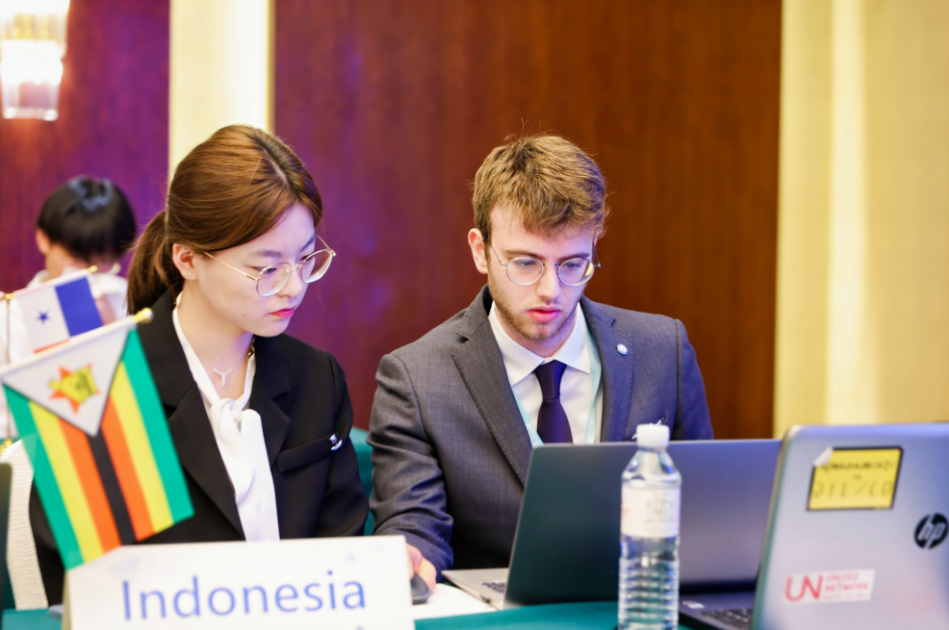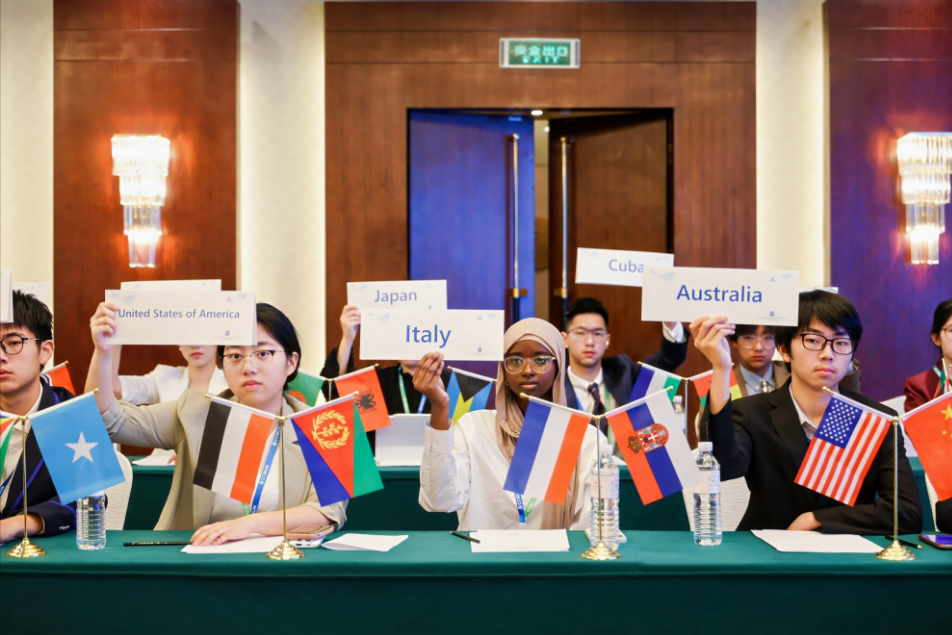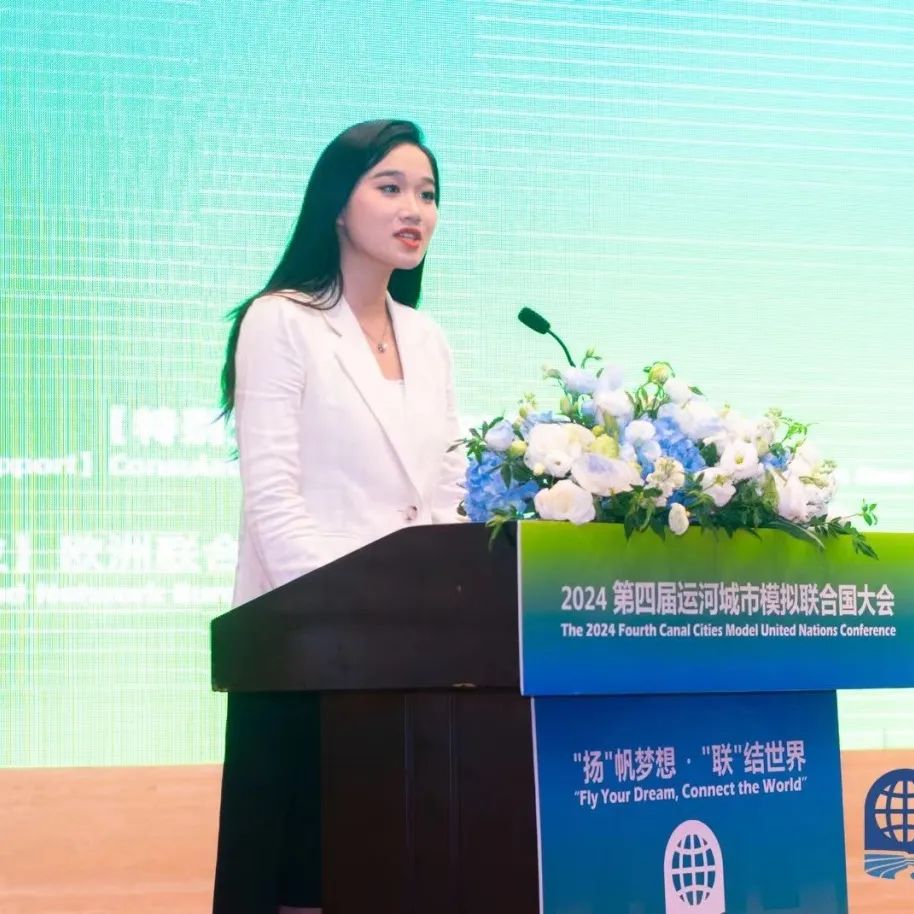In 2025, as the United Nations celebrates its 80th anniversary, this conference, under the theme "Bridging the World," is proudly supported by the Consulate General of China in New York and academically guided by United Network Europe (UNE). With additional support from Yangzhou Municipal Education Bureau and Yangzhou Foreign Affairs Office, it will bring together over 300 young delegates worldwide to address pressing global issues. The conference aims to cultivate international perspectives, negotiation skills, and social responsibility among youth, contributing wisdom to global sustainable development while creating a truly international platform for youth exchange.


Yangzhou Session Details
Dates: July 31 - August 3, 2025
Venue: Yangzhou Conference Center, Jiangsu, China
Committee Listings:
| No. | Committee | Language |
|---|---|---|
| 1 | World Health Organization (WHO) | Chinese |
| 2 | International Telecommunication Union (ITU) | Chinese |
| 3 | UN Commission on the Status of Women (CSW) | English |
| 4 | International Maritime Organization (IMO) | English |
| 5 | UN High Commissioner for Refugees (UNHCR) | English |
| 6 | UN Office on Drugs and Crime (UNODC) | English |
Secretary-General & Academic Director - Yangzhou Session
CCMUN
YOU Yiyun
M.S. in Aerospace Science and Technology
National University of Defense Technology
Advisor, Secretariat of Canal City Model UN Conference
Secretary-General of Yangzhou Session (Previous CCMUN Editions)
Director of External Relations, 7th Northwest China Model UN Conference
Secretary-General, 21st Northwestern Polytechnical University Model UN

World Health Organization (WHO) Committee
Committee Introduction
The World Health Organization (WHO), established on April 7, 1948 and headquartered in Geneva, Switzerland, is a specialized United Nations agency comprising 194 member states. Under the leadership of Director-General Dr. Tedros Adhanom Ghebreyesus (since 2017), WHO serves as the supreme authority in global public health with the mission to "attain the highest possible level of health for all people." Its responsibilities include coordinating international health affairs, establishing health standards, promoting disease prevention, and responding to global health emergencies. In 2021, WHO adopted its first global resolution on rare diseases, mandating member states to improve diagnostic and treatment accessibility, while collaborating with organizations like RDI to establish a global rare disease data-sharing platform.
Topic Introduction
Rare Diseases: Global Collaboration for Diagnosis and Treatment
Despite being termed "orphan diseases" due to their low prevalence, rare diseases collectively affect approximately 400 million people worldwide. The challenges in research and treatment stem from disease complexity, limited financial incentives, and fragmented patient data. These obstacles underscore the critical need for international cooperation.
Faculty Introduction
Academic Director: YANG Yuhang
University of International Relations
• Crisis Committee Staff (1999 Kosovo Crisis), 13th UIRMUN 2025
• Head Chair, European Council, 32nd BLCUMUNC 2025
• Organizing Committee Member, 12th UIRMUN 2024
• Crisis Committee Staff (2011 Libya Crisis), 31st BLCUMUNC 2024
• "Most Promising Award" & "Best Solution", Nankai University Global Competency Program 2024
• UNESCO Dais Member, 4th CCMUN 2024
• Arms Control Committee Chair, LSMUN Summer Session 2024
Chair: WANG Haojie
China Jiliang University (Law)
• Outstanding Chair, 3rd CCMUN 2023
• Executive Board Member, 15th Pan-Yangtze Delta MUN 2023
• Soviet Politburo Member (Khrushchev), Munich Conference Simulation 2023
• Academic Supervisor, Zhoushan MUN Summit 2022
• Distinguished Delegate (Russian Federation), 73rd WHA Simulation 2021
• Best Participation Award, Meishi-Southeast China MUN 2019
Deputy Chairs:
LUO Ruiqi
Beijing Foreign Studies University (Russian & Greek)
• Best Delegate, China Youth Leadership Forum 2025
• Most Promising Delegate, 18th BFSU MUN 2025
• Special Nominee for Global Understanding, WYMUN Sichuan 2022
• Special Nominee for World Leadership, WYMUN High-Level Conference 2022
HONG Leyi
Jiangsu University (Medical Imaging)
• Honorable Mention, Nanjing University National MUN 2025
• Most Promising Delegate, 16th Pan-Yangtze Delta MUN 2024
• Outstanding Delegate, 3rd CCMUN 2023
• Participant, 2nd CCMUN 2022
International Telecommunication Union (ITU) Committee
Committee Introduction:
The International Telecommunication Union (ITU), established in 1865 and headquartered in Geneva, Switzerland, is the United Nations' specialized agency for information and communication technologies (ICTs) and one of the oldest international organizations. As the global governance platform for ICTs, ITU's core functions include:
Developing international technical standards
Coordinating radio spectrum and satellite orbit allocation
Promoting global network interoperability
Advancing digital transformation in developing countries through technical assistance
With 193 member states and over 700 private sector/academic entities, ITU operates through a unique multi-stakeholder governance model. Originally founded as the International Telegraph Union, it has evolved to govern radio communications, satellite systems, and internet technologies, establishing critical standards from 5G to digital broadcasting.
Key initiatives:
• "Connect 2030 Agenda" for digital inclusion
• Global cybersecurity coordination
• AI governance frameworks
• IoT standardization
Topic Introduction:
Global AI Governance: Bridging the Digital Divide Through Technology Sharing
The AI revolution is reshaping global competitiveness, with generative AI simultaneously demonstrating technological advancement and exacerbating the digital divide between developed and developing nations. Emerging solutions like DeepSeek's open-source models present new pathways for technological democratization, coinciding with the collective rise of emerging economies.
Faculty Introduction
Academic Director: WANG Yutong
Tianjin University of Finance and Economics (Human Resource Management)
• Director (DH), 2024 Canal City Model UN Conference
• MUN Advisor, Wuxi Xinwu Experimental Middle School (2023-2024)
• MUN Advisor, Jiangdu Huajun Middle School (2023-2024)
• Director (DH), 2023 CCMUN School Season Conference
• Academic Director, Xinhua High School MUN Association (2020-2022)
Chair: TANG Yuna
Northwestern Polytechnical University (English)
• Dais Member, UN-Habitat - 4th CCMUN (2024)
• Conference Director, 10th Northwest China MUN (2024)
• Outstanding Participant, 13th China International Civil Servant Program (2024)
• Dais Member, Multiple Committees across 7 National MUN Conferences (2023-2024)
Chair: CHOI Yumin (South Korea)
Peking University (New Media Studies)
• Outstanding Chair, 2024 CCMUN Nanchang
• International Student Delegate, 2023 CCMUN Wuxi
• Cultural Exchange Ambassador (Awarded by ROK Embassy in China)
The United Nations Commission on the Status of Women (CSW)
The United Nations Commission on the Status of Women (CSW) is the principal global intergovernmental body dedicated to promoting gender equality and women's empowerment. Established in 1946, it works to shape global standards and policies by reviewing progress, identifying challenges, and setting actionable recommendations.
Key roles:
Policy Guidance: Monitors implementation of agreements like the Beijing Declaration.
Annual Meetings: Governments and NGOs gather to discuss priority themes (e.g., women’s economic rights, ending violence).
Advocacy: Amplifies marginalized voices and promotes gender-inclusive policies.
CSW plays a pivotal role in advancing the UN’s Sustainable Development Goal 5 (Gender Equality).
Nations Commission on the Status of Women (CSW)
Topic:In the field of health and sanitary, the issue of gender gap urgently needs to be addressed. According to the report "Addressing Gender Disparities in Global Health" released by the United Nations Department of Economic and Social Affairs on April 3, 2025, there are significant differences in health between women and men globally. Among the 20 major causes of disease burden, the disability-adjusted life years rate of women is higher than that of men, especially in mental, musculoskeletal and neurological diseases. Bridging the gender gap in health and sanitary is of great significance for promoting women's health and empowerment, and requires concrete actions from all countries and global organizations.
Faculty Introduction
Academic Leadership
This committee's academic direction is provided by our conference partner United Network Europe (UNE), featuring specially appointed faculty members from the Global Citizen Model UN (GCMUN) Secretariat, including an Italian-accented chairperson.
Chair: ZHANG Zining
MA in International Relations, University of York
Advisor, CCMUN Secretariat
Academic Director, Jiangsu Normal University MUN Program
Veteran CCMUN faculty member (multiple editions)
University Lecturer in International Relations
Chair: CHEN Hanrui
Zhongnan University of Economics and Law (Accounting)
Executive Board:
• UNGA, 14th Xiamen No.1 High School Interprovincial MUN (2025)
• INTERPOL, 13th Muxin MUN (2025)
• UNHCR, 14th Athenian Cup National MUN (2025)
Conference Leadership:
• Deputy Secretary-General, 15th Henan Youth MUN Summit (2024)
• Academic Supervisor, WYMUN Henan Conference (2024)
• Dais Member, Multiple Committees (2023-2025)
Chair: WU Gehui
Northwestern Polytechnical University
Conference Operations:
• Logistics Team, 11th Northwest China MUN (2025)
• Recruitment Team, NPU MUN XXIV (2024)
Committee Experience:
• ACHA Dais Member, NPU MUN XXIV (2024)
• Distinguished Delegate (Qatar), UNDP - 10th NWMUN (2024)
• CSCE Delegate (Sweden), PKU Asia International MUN (2024)
the International Maritime Organization(IMO)
The International Maritime Organization (IMO), established in 1948 as a specialized agency of the United Nations, serves as the global standard-setting authority for the safety, security, and environmental performance of international shipping. Its mandate to develop and maintain fair and effective regulatory frameworks, combined with its pivotal role in uniting Member States, civil society, and the maritime industry, positions IMO as a key platform for addressing global maritime challenges. Through comprehensive conventions, technical standards, and initiatives like the Integrated Technical Cooperation Programme (ITCP), IMO advances climate-resilient shipping frameworks and empowers developing nations to implement sustainable maritime systems. Delegates in this committee will have the opportunity to explore critical topics at the intersection of maritime governance and climate change, including strategies for protecting vulnerable coastal communities from climate-induced displacement, enhancing coastal resilience, and promoting sustainable, secure maritime development.
Topic:The importance of this topic lies in its focus on developing maritime strategies to address climate-induced displacement and protect vulnerable coastal communities. As rising sea levels, extreme weather events, and marine ecosystem degradation threaten coastal populations, there is an urgent need for resilient, coordinated maritime responses. Current international frameworks offer limited protection for climate migrants, particularly in cross-border situations, highlighting the necessity for innovative solutions. By emphasizing the maritime dimension of climate resilience, this topic will challenge delegates to design innovative, rights-based strategies that strengthen international maritime governance, protect vulnerable populations, and promote sustainable, climate-adaptive development for coastal regions worldwide.
The United Nations High Commissioner for Refugees(UNHCR)
created to help and protect refugees. It was set up by the United Nations General Assembly in Geneva, Switzerland, in 1950. Originally, UNHCR was meant to solve the refugee crisis after World War II and was planned to operate for only a few years. However, because conflicts, political instability, natural disasters, and other humanitarian problems have continued, UNHCR still works today. Over time, its role has grown. Besides giving emergency aid, UNHCR now focuses on long-term support, creating refugee policies, and standing up for refugee rights. It has become an important organization in global affairs, with a much wider set of responsibilities.
Topic:Migration has become a primary global concern in an increasingly connected world. As globalization brings countries closer together, the number of people moving across borders has skyrocketed. At the same time, anti-immigrant feelings have become more common in many societies. Such attitudes damage social unity within countries and make it harder for different cultures to live and work together peacefully. According to recent reports, there were about 281 million international migrants in 2024, around 3.6% of the world population. Conflict, political unrest, economic problems, and environmental disasters make migration even more complicated today. These forces often cause refugees—people fleeing danger and persecution—to move alongside other types of migrants. In this situation, protecting refugees and guaranteeing their rights has become harder. During the conference, this committee will discuss how governments and international organizations can defend refugee rights and dignity while managing the broader challenges of global migration.
The United Nations Office on Drugs and Crime(UNODC)
The United Nations Office on Drugs and Crime (UNODC), established in 1997, serves as the global leader in addressing illicit drugs, transnational organized crime, corruption, and terrorism. Headquartered in Vienna, Austria, UNODC operates under the mandate of the United Nations General Assembly (GA) and works closely with member states, international organizations, and civil society. UNODC’s governance includes an Executive Director, currently Ms. Ghada Waly of Egypt, and comprises 193 member states. The agency collaborates with entities like INTERPOL, the World Bank, and regional bodies to combat emerging threats, including cybercrime and money laundering in the digital age. In recent years, UNODC has prioritized enhancing digital forensics, strengthening border controls, and supporting legislative reforms to adapt to evolving criminal tactics.
Topic:
Strengthening International Cooperation to Counter Transnational Organized Crime in the Digital Age
Strengthening international cooperation to counter transnational organized crime in the digital age is imperative, as criminal networks increasingly exploit digital technologies for activities such as cyber fraud, darknet trafficking, and cryptocurrency-based money laundering. These borderless crimes harm global security, economy, and human rights. Effective solutions need aligned laws, real-time data sharing, and better law enforcement training. The UN Convention against Transnational Organized Crime (UNTOC) helps, but gaps remain in digital anonymity and cross-jurisdiction issues. UNODC supports the Global Programme on Cybercrime, which offers tech training and public-private partnerships. Since 9/11, efforts have focused on terrorism financing and drug trafficking. Now, integrating AI for threat detection and improving platforms like INTERPOL’s I-24/7 Network are key. Investing in these areas can break criminal networks, protect vulnerable people, and enforce the rule of law globally.



